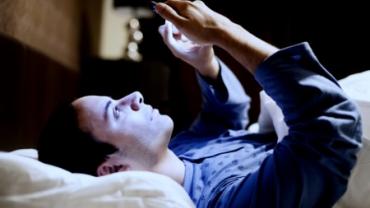
A new study published this week is just in time as teenagers head back to school. These days teens are spending extended periods of time on their computers and smartphones. The light from these bright screens particularly blue light is very effective at preventing the release of melatonin. The pineal gland normally releases melatonin a few hours before bed but if there is enough blue light exposed to the eye the gland can stop releasing melatonin. As a result it takes longer to fall asleep and there is reduced evening sleepiness a postponed circadian clock and reduced next-morning alertness.
Melatonin is necessary for the circadian regulation of sleep. Light exposure at night can prevent anyone from falling asleep but new research from the Journal of Clinical Endocrinology & Metabolism discovered that children ages 9 to 15 in the earlier stages of puberty were especially sensitive to light at night compared to older teens. According to the research team an hour of nighttime light exposure suppressed their production of melatonin significantly more than the same light exposure did for teens ages 11 to 16 who were farther into puberty.
As you would think the brighter the light the more melatonin was suppressed. However small amounts of light at night can still be enough to affect sleep patterns. Students using tablets and computers or watching TV are pushing back their circadian clocks. This makes it much harder to fall sleep. One study found that 96% of teens use at least one form of technology within an hour before bed. This also includes those light-emitting e-readers.
Suppression of melatonin by light at night resulting in circadian disruption has been associated with sleep disturbances increased risk of obesity and diabetes as well as an increased risk for other serious diseases. The use of these light-emitting devices before bedtime can have a powerful effect on the body's natural sleep-wake cycle and may play a role in perpetuating sleep deficiencies.
So as young teenagers start their new school year there are a variety of things to keep in mind in order to help them get a good nights sleep. Teens and their parents should limit the use of screens at bedtime. In addition it is important to go to sleep around the same time every night. When the timing of sleep is shifted even if the duration of sleep is the same it's not going to be as restorative. TV watching and the use of computers should be avoided before bed. Computer screens (smartphones and laptops) emit light in the blue part of the spectrum. This doesn't cause a problem during the daytime but at night this blue light (short-wavelength) limits the production of melatonin. As a result it disturbs your sleep-wake cycle. If you are one of those people who need to be on the computer at night there are free apps you can install that adjusts colors in a way that reduces the stimulating effects of blue light at night.
Also as the late night study sessions will be commencing soon it would be mindful to steer teenagers away from caffeine and other energy drinks four to six hours before bedtime. And for the teens who play sports or for those who simply exercise to stay lean and healthy their workouts should be done earlier in the day and not in the evening hours. Exercise increases cortisol and can make it difficult to fall asleep.
By Michael Jurgelewicz DC DACBN DCBCN